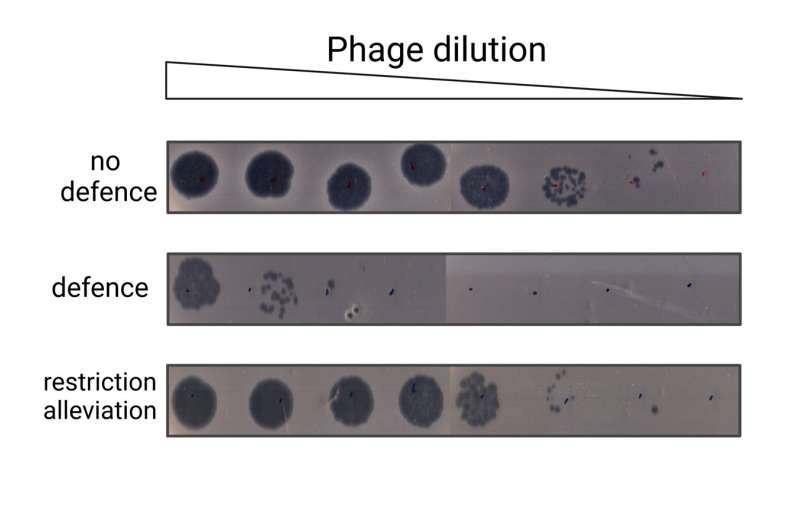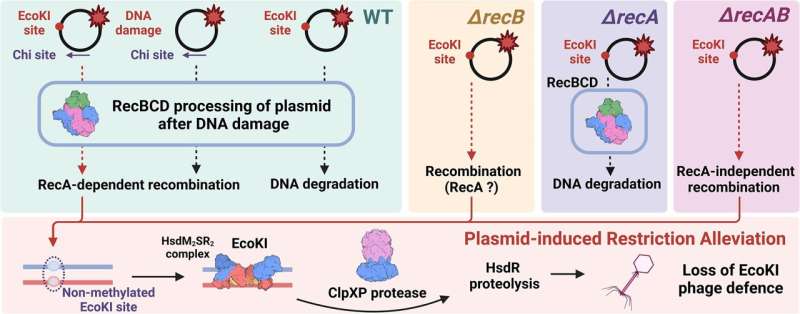Graphical summary of the study. Image source: RecA-dependent or -independent plasmid DNA recombination conflicts with host EcoKI immunity by initiating restriction relief.
Bacterial restriction modification systems are responsible for protecting cells from foreign genetic material such as phages and plasmids. The immune system needs to be tightly regulated because bacteria, like humans, may mount an autoimmune response that attacks their own DNA.
A research team led by Artem Isaev, head of Skoltech’s metagenomic analysis laboratory, studied one of the earliest discovered bacterial immune systems, EcoKI, and found that the presence of plasmid DNA in cells leads to the activation of restriction relief, a built-in immunosuppressive program. This effect is called plasmid-induced restriction relief. This occurs when plasmids with special properties enter cells and conflict with intracellular immunity.The results are displayed in Nucleic acid research Magazine.
Plasmids are mobile genetic elements, circular DNA molecules that are actively exchanged between bacteria, causing them to spread rapidly throughout a population.
“This discovery was completely unexpected. We studied a protein that is supposed to inhibit the EcoKI system, but could not interpret the data. We then wondered: Could the plasmid DNA itself inhibit bacterial immunity? It turned out that having a special element ( The presence of the EcoKI recognition site in the plasmid attracts the EcoKI nuclease to the plasmid DNA, allowing it to degrade the protein.
“This procedure requires protecting cells from unexpected nuclease attacks on bacterial chromosomes, but it turns out that plasmid DNA can also act as a ‘sponge’, attracting EcoKI nucleases and directing them toward proteolysis, thereby completely shutting down bacterial immunity. The plasmids themselves are also harmful because cells become susceptible to phage infection, so we believe that this conflict occurs unintentionally and is simply a reflection of the complexity of different biological mechanisms that can sometimes interfere with each other.

Dark patches are areas of phage lysis. Even at the eighth dilution (first line), the phage was able to infect cells that had no immunity. However, the phage only infects cells with the immune system in the second dilution (second line). In cells with a defense system and a plasmid causing restriction relief, bacterial immunity is suppressed, so the phage infects the cells at higher dilutions (third line).Photo credit: Darya Yanovskaya
The findings help better understand the bacterial recombination process, which allows individual DNA molecules to exchange fragments with their copies within the cell. Cells repair DNA breaks in bacterial genomes through a process of homologous recombination. This process also requires a special sequence called a “Chi” site. If this site is removed, double-stranded breaks result in complete degradation of the damaged DNA plasmid.
“We have established that in order to trigger restriction relief, the plasmid requires a Chi site, i.e. the ability to actively recombine. However, under special conditions, if we remove the cellular components responsible for the main recombination pathway (RecBCD and RecA proteins), we Relief of restrictions can still be observed.
Lead authors Mikhail Skutel and Daria Yanovskaya explain: “This suggests the existence of hidden or alternative recombination pathways in bacterial cells that are not expressed in the presence of RecBCD and RecA. Our new model system will help Explore these mechanisms.
More information:
Mikhail Skutel et al., RecA-dependent or -independent plasmid DNA recombination conflicts with host EcoKI immunity by initiating restriction relief, Nucleic acid research (2024). DOI: 10.1093/nar/gkae243
Provided by Skolkovo Institute of Science and Technology
citation: Mobile genetic elements can inadvertently suppress bacterial immune systems, study shows (2024, April 18), Retrieved April 19, 2024, from https://phys.org/news/2024-04-mobile-genic- elements-inadvertently-suppress.html
This document is protected by copyright. No part may be reproduced without written permission except in the interests of fair dealing for private study or research purposes. Content is for reference only.
#Mobile #genetic #elements #inadvertently #suppress #bacterial #immune #systems #study #suggests
Image Source : phys.org
